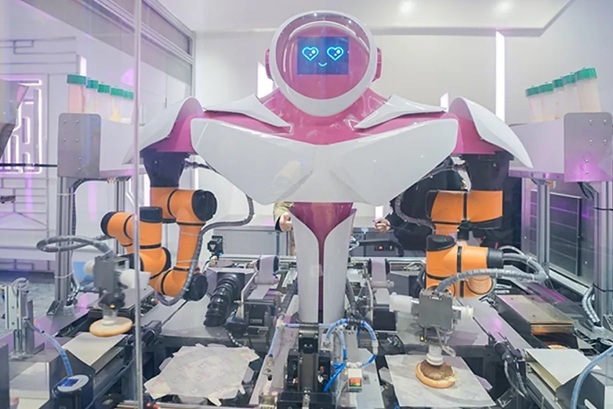There is a Pizza Hut in a busy shopping mall in Shanghai that features a humanoid robot equipped with conversational artificial intelligence at the entrance. The robot welcomes customers, escorts them to an available table, and then displays a screen showcasing the most popular menu items. In China's financial capital, some establishments of other major chains like KFC or Haidilao (specializing in hotpot) are also integrating these locally manufactured robots into their service. Currently, their role is mainly customer service-oriented, but the plan is for them to soon enter the kitchens.
Shanghai, a modern mega-city with over 26 million inhabitants, is becoming the world's largest incubator for automated gastronomy. Gone are the days of attention-grabbing projects focused on robot waiters and QR code-scannable menus. The current trend is moving towards fully autonomous restaurants, where AI not only manages customers but also food preparation, monitoring, and delivery.
This week, the municipal government released a roadmap with the goal that by 2028, over 70% of fast-food chains, cafes, and canteens will integrate automated systems in all operational phases, and that conventional restaurants will adopt AI in over 50% of their core functions.
To achieve this, the creation of large centralized robotized kitchens will be promoted, interconnected through data networks and equipped with high-precision articulated arms, advanced thermal sensors, and computer vision systems capable of preparing thousands of recipes in minutes, without variations in taste, texture, or presentation.
"Fast-food establishments will need to adopt intelligent beverage dispensers, frying robots, rice-cooking robots, and burger assembly machines to increase efficiency," states the action plan published by the Shanghai Commerce Commission.
The document emphasizes that local authorities will "support large restaurant chains and catering providers in building intelligent central kitchens that integrate automated systems for washing, cooking, and packaging."
This transition is not starting now. A couple of years ago in Shanghai, the first community dining halls opened where robotic arms fry, bake, boil, or steam dozens of dishes in the kitchens. For example, in a neighborhood surrounded by factories in the north of the city, one can find a so-called "smart canteen." Here, in addition to cooking, robotic arms pack the dishes, and diners only need to take their tray and pass it through an AI cash register that calculates the meal's price.
Technological developers working with local authorities on smart restaurant projects assure that in a few years, these robotic arms will have perfected "culinary AI" trained in thousands of recipes, not just reheating dishes previously cooked by humans (as some establishments in the city currently do).
Furthermore, restaurants will have enhanced receptionist robots trained with generative AI to interact more smoothly with customers and provide recommendations based on the diner's emotional profile. Automating the food sector reduces costs for businesses and keeps prices stable.
"Robots can cook dishes as delicious as human chefs," states Chen Rui, an executive at Botinkit, a kitchen robotics company based in Shenzhen that is promoting a cooking robot named Omni, who already works in kitchens as an assistant, sautéing or stewing some dishes. It is integrated with AI that allows the robot to measure the appropriate temperature and seasoning during the cooking process.
All these advancements do not convince many hospitality workers in Shanghai, who see the day when robots literally take their jobs as increasingly imminent. The complete replacement by machines is drawing closer. Thousands of traditional jobs - cooks and waiters - could disappear, making way for other roles focused on supervision and technical maintenance.
According to a recent study by Fudan University, automation could lead to a 78% reduction in operational-level hospitality jobs, but at the same time, there could be a 200% increase in specialized technical jobs, such as AI engineers, sensory calibrators, or algorithmic gastronomic experience designers.
Amid technological enthusiasm and labor concerns, Shanghai is in the midst of a transition towards a model where cooking, like many other areas, may gradually cease to be exclusively a human art and become a symphony of algorithms, sensors, and mechanical arms.
